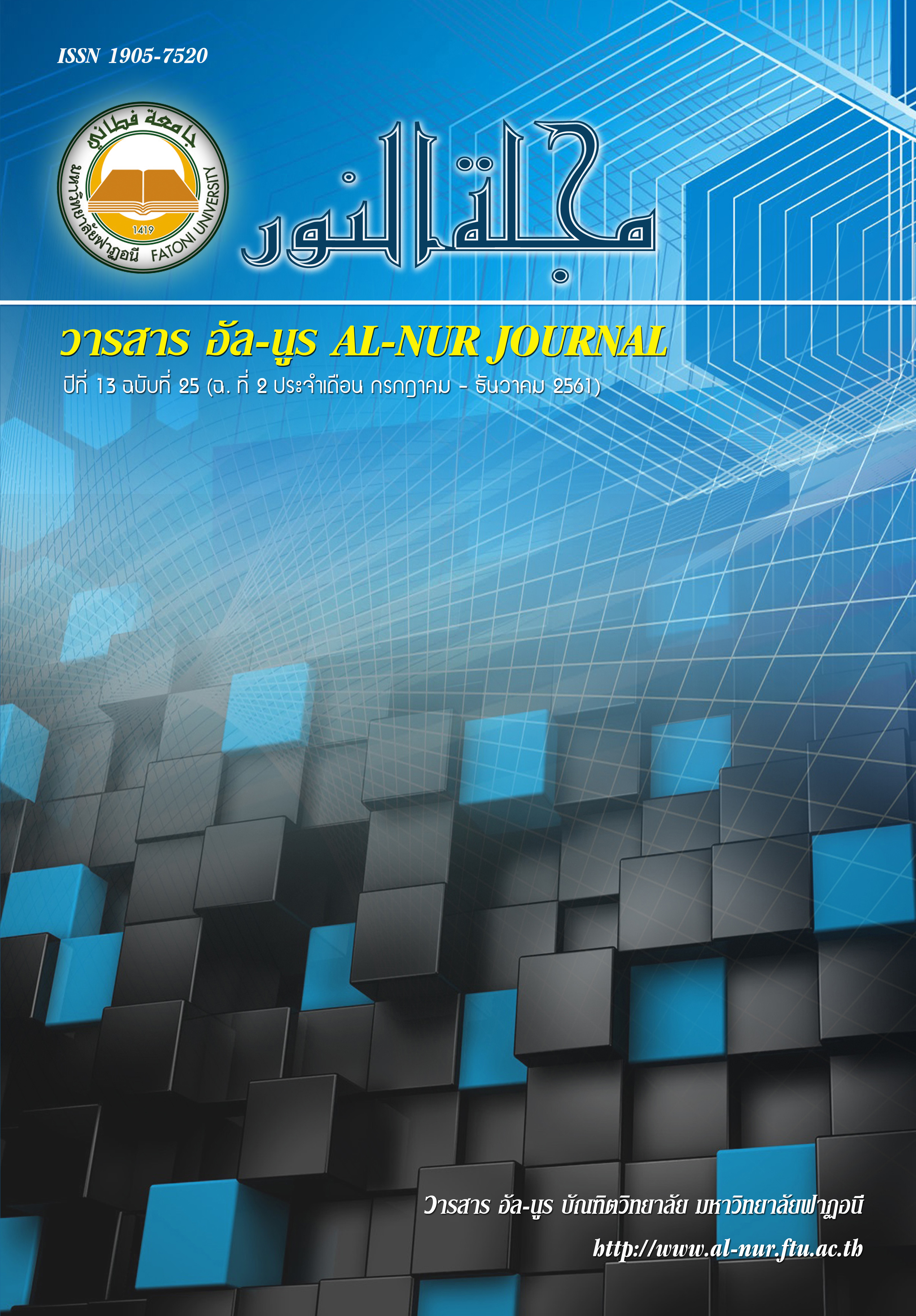The Development of Learning Management Strategy by Integrating Knowledge Management and Coaching Approaches for Enhancing Reading Comprehension and Creative Writing Teaching Abilities for the Primary School
Keywords:
แนวคิดการจัดการความรู้, แนวคิดการสอนงาน, ความสามารถในการสอนการอ่านและการเขียนเชิงสร้างสรรค์ของครูภาษาไทยระดับประถมศึกษา, ยุทธศาสตร์การจัดการการเรียนรู้Abstract
The purposes of this research were: 1) to develop the learning management strategy for the primary school Thai language teachers by integrating knowledge management and coaching approaches for enhancing reading comprehension and creative writing teaching abilities, 2) to study the efficiency of the learning management strategy by integrating knowledge management and coaching approaches consisted of; 2.1) to study and compare the reading comprehension and creative writing teaching before and after being taught by learning management strategy 2.2) to study the competency in reading comprehension and creative writing teaching which were; 2.2.1) to study the competency in planning for learning management to reading comprehension and creative writing teaching 2.2.2) to study learning behavior for reading comprehension and creative writing 3) to study the Thai teachers’ satisfaction towards the learning management strategy, and 4) to study the ability for reading comprehension and creative writing of the students. The sample were; 1) 13 Thai teachers in the 2nd semester of the academic year of 2016 selected by purposive sampling, 2) 100 students from 5 classes selected by purposive sampling. This research was conducted under One Group Pretest-Posttest Design. Both qualitative and quantitative data were collected and analyzed for mean, standard deviation, and t-test for dependent samples.
The research findings were as follows:
- The Learning Management Strategy for the primary school Thai language teachers by integrating knowledge management and coaching approaches for enhancing reading comprehension and creative writing teaching abilities were 5 components as follows: 1) Strategy Principle 2) Theory 3) Strategy Objectives 4) Strategic learning management process were; 4.1) The learning management process developed by integrating the concepts of knowledge management and coaching approaches composed of 7 steps; (1) Raising awareness; (2) Learn and create jobs; (3) Development and Learning for the first time; (4) Reflection of knowledge for the first time; (5) Development and Learning for the second time; (6) Reflection of knowledge for the second time; and (7) Presentation 4.2) Factors supporting learning management were 2 Factors; The environment for learning and Collaboration with school administrators. 5) Evaluating the strategy.
- The results of the implementation of the learning management strategy were found that:
2.1) The primary school Thai language teachers had more knowledge and understanding for enhancing reading comprehension and creative writing teaching abilities than before the use of learning management strategies and the Post test mean score was higher than 75 percent.
2.2) The primary school Thai language teachers had ability to plan learning management after learning management strategies and the Post test mean score was higher than 75 percent.
2.3) The primary school Thai language teachers’ behavior in learning management strategies and Post test mean score was higher than 75 percent.
2.4) The primary school Thai language teachers were satisfied with learning management by using the learning management strategy at a high level.
2.5) Students had the ability in reading comprehension after learning more than 75 percent.
2.6) Students had the ability in creative writing after learning more than 75 percent.
References
พลสัณห์ โพธิ์ศรีทอง. (2555). การพัฒนาสมรรถนะ (Competency) ของ บุคลากร : ผู้บริหารสถานศึกษา. กรุงเทพฯ : คุรุสภา.
วิจารณ์ พานิช. (2547). การจัดการความรู้กับการบริหารราชการไทย. กรุงเทพฯ: สถาบันการจัดการความรู้เพื่อสังคม.
ศิริวัฒน์ เฮงไชโย. (2542). การประเมินความพึงพอใจของนักศึกษาต่อกระบวนการเรียนการสอน ระดับปริญญาตรี โปรแกรมวิชาวิทยาการคอมพิวเตอร์ กลุ่มสถาบันราชภัฎภาคใต้. วิทยานิพนธ์ศึกษาศาสตรมหาบัณฑิต มหาวิทยาลัยเทคโนโลยีพระจอมเกล้าธนบุรี กรุงเทพมหานคร.
สามารถ ทิมนาค. (2553). การพัฒนารูปแบบการนิเทศการสอนตามแนวคิดของกลิ๊กแมนเพื่อพัฒนาสมรรถภาพการจัดการเรียนรู้ด้านทักษะการอ่านของครูภาษาไทย. วิทยานิพนธ์ปริญญาปรัชญาดุษฎีบัณฑิต สาขาวิชาหลักสูตรและการสอน มหาวิทยาลัยศิลปากร.
สำนักงานเขตพื้นที่การศึกษาประถมศึกษา อุดรธานี เขต 4. (2558). รายงานผลการดำเนินงานตามแผนปฏิบัติราชการ ประจำปีการศึกษา 2557. อุดรธานี: กลุ่มนิเทศติดตามและประเมินผลการจัดการศึกษา สำนักงานเขตพื้นที่การศึกษาประถมศึกษา อุดรธานี เขต 4.
สำนักงานคณะกรรมการการศึกษาขั้นพื้นฐาน. (2551). เอกสารประกอบหลักสูตรแกนกลางการศึกษาขั้นพื้นฐาน พุทธศักราช 2551 แนวปฏิบัติการวัดและประเมินผลการเรียนรู้. กรุงเทพฯ: โรงพิมพ์ชุมนุมสหกรณ์การเกษตรแห่งประเทศไทย.
สำนักงานเลขาธิการสภาการศึกษาไทย . (2553). ระเบียบสำนักนายกรัฐมนตรีว่าด้วยการขับเคลื่อนการปฏิรูปการศึกษาในทศวรรษที่สอง พ.ศ. 2552. กรุงเทพฯ: พริกหวานกราฟฟิก.
สำลี ทองทิว. (2545). หลักและแนวปฏิบัติในการพัฒนาหลักสูตรสถานศึกษา: กรณีวิชา วิทยาศาสตร์ระดับสถานศึกษา. กรุงเทพฯ: ศูนย์ตำราและเอกสารทางวิชาการ คณะครุศาสตร์ จุฬาลงกรณ์มหาวิทยาลัย.
อาจอง ชุมสาย ณ อยุธยา. (2548). การพัฒนาศักยภาพอย่างสมบูรณ์. กรุงเทพฯ: รามาการพิมพ์.
Biggs, John B. & Moore, Phillip J. (1993). Process of Learning. 3thed. Sydney: Prentice Hall.
Bloom, B. S. (1976). Human characteristics and school learning. New York: McGraw-Hill.
Brooks, J. G., & Brooks., M. G. (1993). In Search of Understanding: The Case for the Constructivist Classroom. Alexandria , VA : ASCD.
Bruner, Jerome. (1977). The Process of Education. Massachustts: Harvard University Press
Costa, Arthur L. & Robert. J. Garmston. (2002). Cognitive Coaching Foundations Seminar Learning Guide. Highlands Ranch, Co: Center for Cognitive Coaching.
Davenport, T. H. & Prusak, L. (1998). Working Knowledge: How Organizations Manage What They Know. Harvard Business School Press, Boston, MA.
Henderson, J. G. (1996). Reflective Teaching : The Study of your Constructivists Practices. Englewood Cliffs. New Jersey: Prentice Hall.
Knowles, M. S. (1980). The modern practice of adult education: From pedagogy to andragogy. Englewood Cliffs: Prentice Hall/Cambridge.
Nonaka, I. (1998). The knowledge-creating company. Harvard Business Review, 69(6), 96-104.
O’Dell, C. & Grayson, C. J. (1998). If only we knew what we know: identification and transfer of internal best practice. California Management Review.
Piaget, J. (1978). Behavior and evolution (D. Nicholson-Smith, Trans.) New York: Random House.



